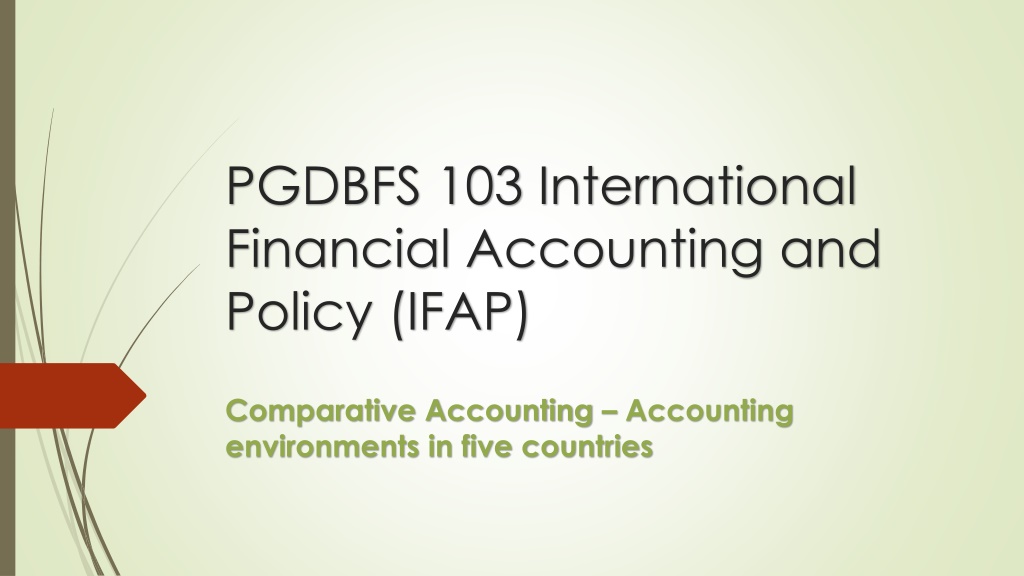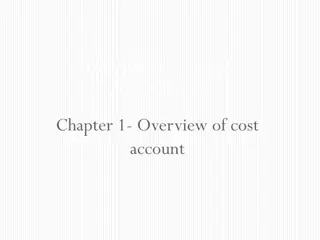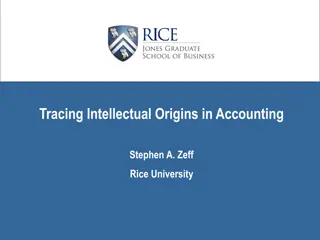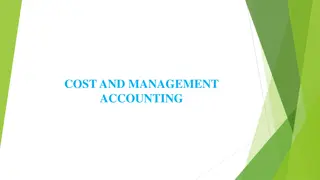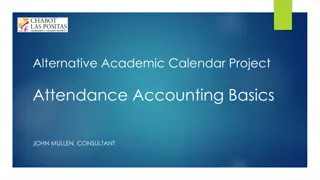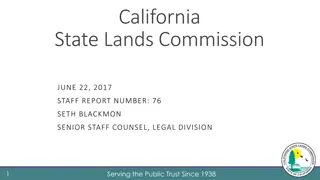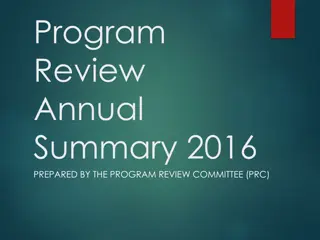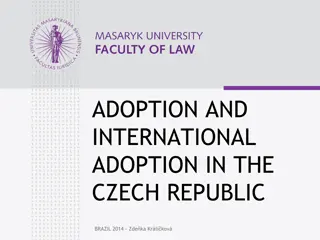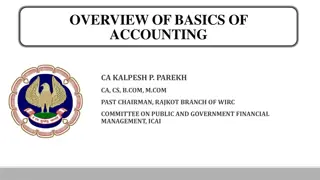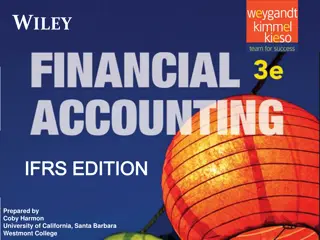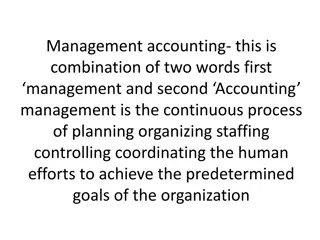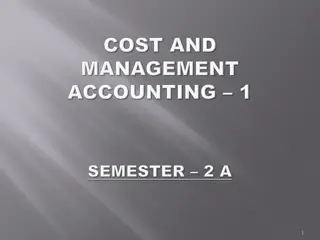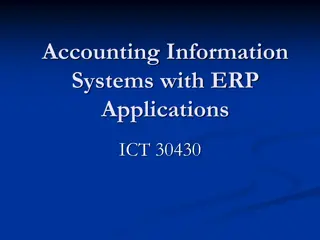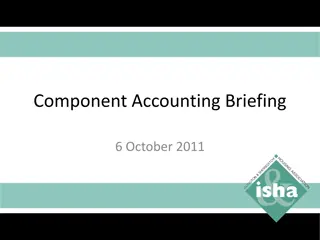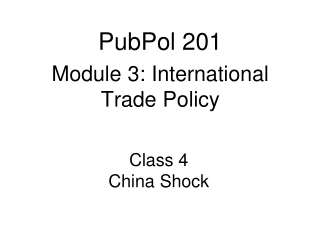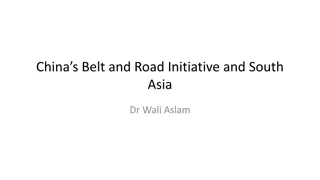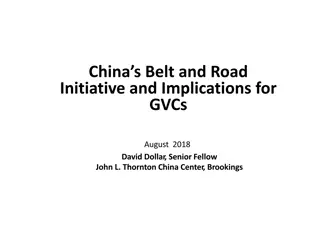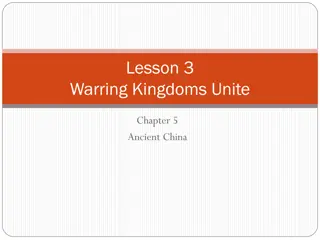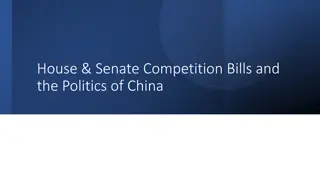Accounting Environment in Peoples Republic of China (PRC)
The accounting environment in Peoples Republic of China (PRC) has undergone significant changes from a planned economy to a socialist market economy. With the emergence of private enterprises and foreign investments, the accounting profession has evolved as well. Guanxi, the concept of networks and connections, plays a crucial role in business opportunities. The government regulates accounting practices, aiming to harmonize Chinese standards with international ones such as IFRS.
Download Presentation

Please find below an Image/Link to download the presentation.
The content on the website is provided AS IS for your information and personal use only. It may not be sold, licensed, or shared on other websites without obtaining consent from the author. Download presentation by click this link. If you encounter any issues during the download, it is possible that the publisher has removed the file from their server.
E N D
Presentation Transcript
PGDBFS 103 International Financial Accounting and Policy (IFAP) Comparative Accounting Accounting environments in five countries
Peoples Republic of China (PRC) Background The ultimate legislative authority rests with the National People s Congress. With the formation of PRC in 1949 the government adopted a policy of public ownership and centralized management of business and economic resources. However the state owned enterprises proved to be an economic failure. This lead to economic reforms, transforming the centrally planned economy in to a socialist market economy. This is a market based economy model with socialist principals. Private enterprises, corporative and joint ventures coexist and compete with state run entities. Opened doors to foreign direct investments (FDI). In early 1990 s China opened its stock exchanges in Shanghai and Shenzhen to facilitate the non-governmental ownership and FDIs. Shanghai stock exchange is the 5thlargest stock exchange in the world today. China s accounting practices were often criticized for falling short of those set of IASB. An accounting practice aimed at measuring how well production targets are met in a planned economy was largely incapable of meeting the requirements of a market economy.
Peoples Republic of China (PRC) Accounting profession During Feudal system, people respected scholarly officials. Accounting for business was viewed as a non-skilled profession. The first local professional accounting body, the Chinese Chartered Accountant s Society of Shanghai was established in 1925. The economic reforms in 1980s gave rise to a large number of Sino-foreign joint ventures in China. This resulted in the reemergence of private auditing profession. The Chinese institute of Certified Public Accountants (CICPA) was formed in 1988. Earlier Accounting firms were overseen by the Ministry of Finance, while the audit firms were under the State Administration of Audit (SAA) a department within the State Council responsible for government audits. The competition between Accountants and Auditors was confusing. Consequently, Ministry of finance was given the authority to regulate both the accounting and auditing professions. At present More than 200 of the world s largest 500 companies have invested in china. All the leading international accounting firms, following their clients, have moved in to China.
Peoples Republic of China (PRC) Guanxi Guanxi (pronounced gwon-she) is a Chinese term meaning "networks" or "connections" is a central idea in Chinese society. The odds of gaining access to a business opportunity and then winning that opportunity are higher when you work your connections. In recent years, the ethical consequences of guanxi have been brought into question. Accounting regulation Government continues to act as the accounting regulator in order to retain political control. The China Accounting Standard Committee (CASC) comprising government experts, academics and members of accounting firms was established within the MoF in 1998. In recent years accounting regulation in china has been influenced mainly by China s desire to harmonize Chinese accounting with IFRS. Companies listed in HK may choose to use IFRS or HKFRS, in addition to the reporting required under Chinese Accounting Standards.
Germany Background After the Second World War Germany was divided into American, French, British and Soviet zones of occupation. In 1949, the Federal Republic of Germany was created out of the western zones and the communist lead German Democratic Republic was established in the Soviet zone. The two zone were reunified in 1990, symbolized by the falling of Berlin wall. There are eight stock exchanges in Germany. FSE is one of the world s first stock exchanges next to London and Paris. Traditionally the primary source of finance for German companies is bank loans. Banks not only provide loans but also control major portions of equity capital, either directly or as trustees for their customers. Since reunification, German accounting has been greatly affected by the increasing internationalization of the economy and growing integration of the world s capital markets. Historically, Germany has had a considerable influence on the accounting systems in many countries, especially Japan, Austria, Switzerland, and some Nordic countries such as Denmark and Sweden.
Germany Accounting profession Auditing dominates the financial reporting related professional activities in Germany. The Institute of Auditors in Germany, comprises over 11,000 public auditors and over 900 public audit firms. This represents about 85% of the profession. Publishing accounting and auditing standards is a responsibility of the Institute of Auditors. There are stringent requirements to become an auditor as defined by Law. [e.g a university degree; passing separate exams covering accounting, auditing, law, taxation, economics; four years practical experience including two years in auditing]. The German auditing profession in much smaller than some of the other developed counties. E.g. 11,000 auditors (population approx. 85Mn), compared to 250,000 in USA (population approx. 300Mn) There also is a second-tier body of certified accountants. The requirement to become a certified accountant is less than a certified auditor. Certified accountants are only allowed to perform voluntary audits and audits of medium sized limited liability companies. A third type of professional accountant in Germany are the Tax advisors, who focus on offering tax services to clients.
Germany Accounting regulation Financial reporting in Germany is dominated by commercial law, tax law and pronouncements issued by the profession. The principal of prudence (conservatism) has predominance, and is clearly established by law. In 1965 The Companies Act was enacted, along with changing of the financial reporting orientation from creditors to shareholders. In 1998, German law was amended to allow a private sector body to develop accounting standards. Accordingly, the German Accounting Standard Committee (GASC) was created. GASC has two standing committees: German Accounting Standard Board (GASB) Accounting Interpretations Committee (AIC) In recent years, the IFRS has gain popularity. Further German accounting has also been heavily influenced by EU directives.
Germany Accounting regulation Listed companies Companies applied for listing Non-listed companies Consolidated financial statements Mandatory adoption of IFRS from 01 Jan 2005 Mandatory adoption of IFRS from 01 Jan 2007 Option to choose from German Standards and IFRS from 1 Jan 2003 Individual financial statements All companies must prepare financial statements in accordance with German Accounting Standards. For informative purpose they may also prepare financial statements in accordance with IFRS.
Germany Accounting principals and practices The principal of creditor protection plays an important role. Accordingly, the primary function of financial accounting is the conservative determination of distributable income, after ensuring payments to the creditors and the long- term prospects of the company. The conservative measurement is also influenced by a desire to mitigate labour union demands for higher wages and to report stable income over time. The information needs of the investors (representing a true and fair view) is not the primary focus in financial reporting. Generally financial statements are the basis for taxation. Hence there is minimum difference between accounting income and taxable income. Globalisation and EU directives have had an impact on the German accounting in recent times. Accordingly more and more German companies are preparing IFRS based financial statements, which is a move towards, true and fair view reporting.
Japan Background A unique aspect of Japanese business is cross-corporate ownership. About 70% of the equity shares of listed entities are cross-owned by corporate. Shareholders. The manner in which business is organized in Japan reflects its cultural value of collectivism. The main source of finance for Japanese businesses are through bank credit and cross-corporate ownership. Banks have access to their client s financial information, hence there is less pressure for public disclosures. There is less emphasis on short-term results. Corporate earnings are regarded as a source of funds that can be distributed, at the discretion of the shareholders, rather than as a measure of corporate performance. With the recession in 1990s the ability to raise capital from the domestic market contracted. As the need to attract FDI grew, there is increased need to respond to the demands of the international capital markets.
Japan Accounting profession Currently, members of the accounting/auditing profession in Japan practice with the title Certified Public Accountants (CPA) under the Certified Public Accountants Law, legislated in 1948. The CPA law established the Japanese institute of Certified Public Accountants (JICPA). JICPA has been heavily involved in the international harmonization process, being one of the nine founding members of IASC. Because of the cultural value of collectivism, an independent auditor in Japan does not fit in the role of someone to be trusted or relied upon. The process of setting accounting standards was initially driven by the Ministry of Finance. This was changed with the establishment of Financial Accounting Standard Foundation (FASF) in 2001. The Accounting Standard Board of Japan(ASBJ) was established under the FASF as an independent private-sector entity to develop accounting standards in Japan. In 2005, the ASBJ announced the launch of a joint project with IASB aims at achieving convergence between Japanese GAAP and IFRS.
Japan Accounting regulation Accounting and financial reporting in Japan is regulated by three types of law: Commercial Code Securities and Exchange Law Corporate Income Tax Law Japanese economy experienced rapid growth from mid 1950s to the 1980s. In late 1980s however the exports and stock prices started to fall and the economic growth came to a halt. In response to it the Japanese government announced a strategy for financial reforms in 1996, which included reforming the financial reporting system. One of the major objective of these reforms was to make the Japanese Accounting Standards fall into line with international standards.
Japan Accounting principals and practices Disclosure requirements of Japanese companies are based on the Commercial code, SEL and ASBJ accounting standards. There is reluctance to share information with outsiders and a reluctance to voluntarily disclose information publicly. Efforts have been made in recent time to bring Japanese accounting principles and practices closer to international standards. In 2007 Tokyo Agreement was signed between ASBJ and IASB to accelerate the process of convergence between Japanese accounting standards and IFRSs. As a further step towards adopting IFRS in Japan, in 2010 regulatory changes were announced that permitted domestic use of IFRS as an accounting framework in the preparation of financial statements.
Mexico Background Mexico was a Spanish colony from1519 to 1821. Current population in excess of 123Mn. Mexico is a federal republic consisting of 31 states. Until about few decades ago most businesses were controlled and owned by the government. There are certain industries that are owned by the government (e.g. exploration and refinement of oil, distribution of electricity). From mid 1970s until the late 1980s, Mexico experienced persistent balance of payment problems resulting from the government s effort to defend the overvalued Peso and incurring massive external debt. In recent years : major effort to privatize state-owned enterprises; Most restrictions on investments by foreigners have been removed opening the door to external capital. This process has further strengthened by NAFTA entered into between Mexico, USA and Canada. In 1994, Mexico plunged into financial crisis, as it could not pay billions of dollar denominated short-term bills. To come out of the crisis Mexico accepted US$40Bn bailout package from the US Treasury and IMF, which came with some tough conditions. 2009 financial crisis (which also affected US and a number of other European countries), had a devastating effect on Mexico as well.
Mexico Accounting profession The Mexican Institute of Public Accountants (MIPA) was established in 1964. MIPA is an independent non-governmental professional organization governed by three bodies: The General Conference of Members Governance Group National Executive Committee The first two bodies mainly perform sponsoring and oversight functions, whereas the NEC s major responsibilities relate to the day-to-day activities of MIPA. Responsibilities of MIPA include: Oversee the professional conduct of its members. Investigate complaints against members with regard to professional conduct. Establish continuing professional education requirements to its members MIPA conducts examinations for those qualifying accountants who intend to obtain the title Certified Public Accountant (CPC in Spanish). Mexican CPC is considered equivalent to the CPAs of US and Canada Mexican Board of Research and Development of Financial Reporting Standards (CINIF in Spanish) is responsible for issuance of Mexican Accounting Standards.
Mexico Accounting regulation The accounting regulation in Mexico is through legislation, stock exchange listing requirements and accounting standards. Mexican law requires all companies to be audited by a Mexican CPA. Accounting standard setting in Mexico takes an Anglo-American approach rather than a Continental European one (despite the countries Spanish influence). Until 2004, Accounting Standards were the responsibility of the Accounting Principles Commission of MIPA. Since June 2004 CINIF assumed the duties and responsibilities for issuance of Mexican Accounting standards. MIPA issued standards - Mexican GAAPs CINIF issued standards - Financial Reporting Standards (FRS). Mexican FRSs are very similar to US GAAPs and IFRS. Similar to the requirements of the Sarbanes-Oxley Act in USA, since 2003 the CEO and CFO of a listed entity must certify the completeness and accuracy of its quarterly and annual financial statements.
Mexico Accounting principals and practices Mexican FRSs are known as bulletins. The generally accepted accounting principles in Mexico consist of the following, in order of its importance: CINIF (Formally MIPA) bulletins. CINIF (Formally MIPA) circulars or interpretations. International Financial Reporting Standards Accounting principles of other countries that would be applicable in the circumstances. In practice, US GAAPs are the main source applied. In recent years Mexican accounting principals have been heavily influenced by the US accounting practice due to Mexico s membership in NAFTA. MIPA being one of the nine founding members of IASC has shown keen interest in international harmonization of accounting standards. US had a dominant influence in Mexican Accounting. However, US GAAPs did not always meet the Mexican requirements. As a result the standard setters of Mexico have also looked at the Principal based IFRS as a reference for upgrading Mexican GAAPs. This is a sign towards convergence with IFRS in recent years.
United Kingdom Background United Kingdom constitute of four constituent regions: England, Wales, Scotland and Northern Ireland. Legislative authority lies with Parliament, which include the House of Commons (659 directly elected members) and the House of Lords (consist of hereditary peers, certain senior judges, Bishops of the Church of England etc). Limited Liability Company is the main form of business in the UK, and Capital market provides the main source of funding. Therefore, facilitating the efficient working of the capital market is the primary purpose of accounting. UK has the largest number of entities listed in a regulated market in the European Union.
United Kingdom Accounting profession Accounting in the UK grew as an independent discipline, responding to business needs. It has had significant influence on the development of the accounting profession in many countries (Canada, Australia, New Zealand etc). There are six professional accounting bodies in the UK. In order of its membership size, these are: The Institute of Chartered Accountants of England and Wales (ICAEW) The Institute of Chartered Accountants in Scotland (ICAS) The Institute of Chartered Accountants of Ireland (ICAI) The Association of Chartered Certified Accountants (ACCA) The Chartered Institute of Management Accountants (CIMA) The Chartered Institute of Public Finance and Accountancy (CIPFA)
United Kingdom Accounting profession The activities of the six bodies are coordinated through the Consultative Committee of Accountancy Bodies (CCAB), established in 1974. Members of CIMA and CIPFA are not allowed to sign audit opinions. All six professional accounting bodies set comprehensive exams for admission into their bodies. The aspiring members are also required to enter into training contracts in approved organisations and obtain the relevant experience before being admitted as members. Over the years there had been several attempts to consolidate the UK accountancy profession by merge of the three professional bodies (ICAEW, CIMA and CIPFA); however, this has not materialized as a result of the inability to reach an agreement on some aspects of the merger.
United Kingdom Accounting regulation Traditionally, the determination of acceptable accounting principles and standards was left on the hands of the accounting profession. Recently the Financial Reporting Council (FRC) has become a powerful independent regulator responsible for promoting confidence in corporate reporting and governance. In 2000, British government in partnership with the professional accounting bodies, established the Accountancy Foundation, to be responsible for the independent regulation of the six professional chartered accountancy bodies. Purpose was to ensure self-regulation is conducted in public- interest. The establishment of the Accounting Standard Steering Committee in 1970 by ICAEW was the development of formal accounting standards in the UK. The committee was later re-designated as the Accounting Standard Committee (ASC), as a joint committee of the six professional bodies. In 1980s ASC came into heavy criticism due to low quality of its standards and for lack of effective means of monitoring compliance. In response, following bodies were created: The Accounting Standard Board (ASB) has authority to issue accounting standards. The Financial Reporting Council (FRC) has overall policy control over the standard setting process. The Financial Reporting Review Panel (FRRP) - to oversee compliance ASB is institutionally separated from the accounting profession and hence with its creation in 1990, the direct influence the accounting profession had on standard-setting reduced. Following the major corporate collapses in the US, in 2003 the government announced reforms, which include FRC taking over the responsibilities of the Accountancy Foundation. Accordingly FRC became the single, independent regulator of accounting and auditing in the UK.
United Kingdom Accounting principals and practices Accounting principles in the UK are developed primarily emphasizing on the needs of the investors. Companies are required to prepare financial statements to provide a True and Fair view of the company s financial position and performance (results of operations). Auditors are given the corresponding responsibility to render an opinion on whether the financial statements do present a True and Fair view. Since 2005, UK listed entities are required to prepare its group financial statements (consolidated financial statements) following IFRSs. They are also permitted (but not required) to use IFRSs for their individual accounts. Other companies (non-listed entities) are permitted (but not required) to use IFRSs for their consolidated and individual accounts.
